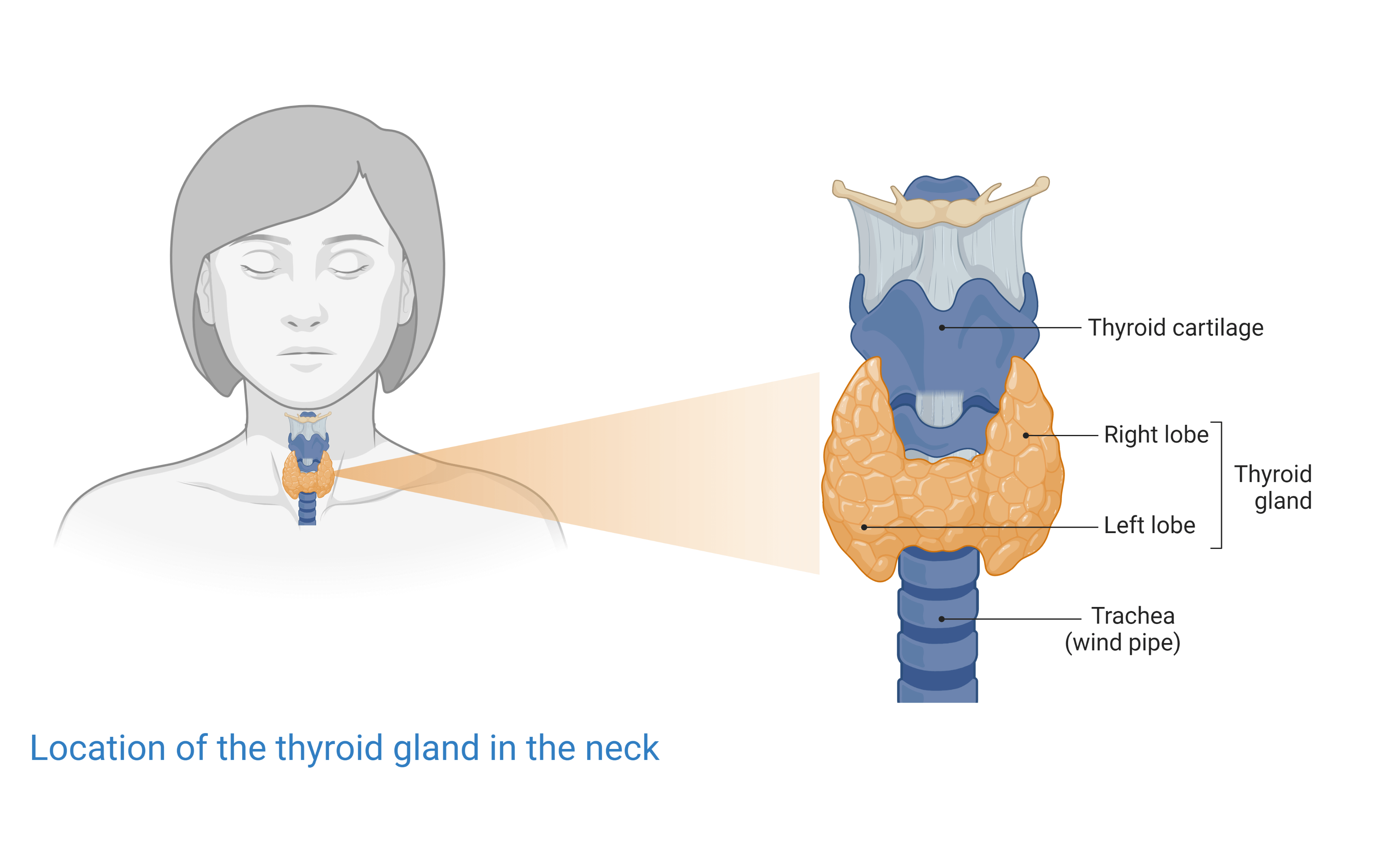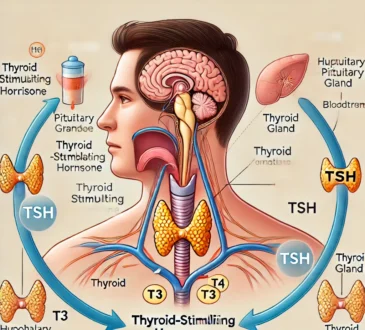
What is the thyroid?
The thyroid is a small butterfly-shaped gland located in the front of the neck, just below the Adam’s apple. It is part of the endocrine system and plays a crucial role in regulating various metabolic processes in the body. The thyroid gland produces hormones, primarily thyroxine (T4) and triiodothyronine (T3), which control the rate at which the body uses energy and affects vital functions such as heart rate, body temperature, and metabolism.
Thyroid hormones are essential for the proper development and functioning of almost every organ in the body. They help regulate growth and development, maintain body temperature, control the metabolism of proteins, carbohydrates, and fats, and influence the function of the heart, brain, and other organs.
Know about TSH test if you have thyroid
Disorders of the thyroid gland can occur when it produces too much or too little hormone. When the thyroid gland is overactive and produces excessive amounts of thyroid hormone, it results in a condition called hyperthyroidism. This can lead to symptoms such as weight loss, increased heart rate, anxiety, tremors, and heat intolerance. On the other hand, when the thyroid gland is underactive and doesn’t produce enough hormone, it leads to a condition called hypothyroidism. Hypothyroidism can cause symptoms like fatigue, weight gain, depression, cold intolerance, and dry skin.
Thyroid disorders can be diagnosed through blood tests that measure the levels of thyroid hormones and other related substances. Treatment for thyroid disorders depends on the specific condition but may include medications to restore hormone balance, radioactive iodine therapy, or surgery in some cases.
It’s worth noting that while the information provided here is accurate based on current medical knowledge, it’s always recommended to consult a healthcare professional or endocrinologist for personalized advice and information regarding thyroid health.
What is the role of the thyroid gland?
The thyroid gland serves several important functions in the body:
Regulation of Metabolism: Thyroid hormones (T3 and T4) play a vital role in regulating the body’s metabolism. They influence the rate at which cells convert nutrients into energy, affecting processes like digestion, heart rate, and body temperature.
Growth and Development: Thyroid hormones are essential for proper growth and development, particularly during infancy and childhood. They promote normal brain development and help regulate the growth of bones and tissues.
Body Temperature Regulation: The thyroid gland helps maintain body temperature by regulating the production and release of heat.
Energy Production: Thyroid hormones facilitate the conversion of oxygen and calories into usable energy for the body’s cells.
Regulation of Heart and Digestive Functions: The thyroid gland influences heart rate and rhythm, helping to maintain a healthy cardiovascular system. It also plays a role in the regulation of digestive processes.
Regulation of Hormones: The thyroid gland interacts with other endocrine glands, such as the pituitary gland, to regulate the production and release of various hormones throughout the body. This coordination helps maintain hormonal balance and overall bodily functions.
Brain Function and Mental Health: Thyroid hormones are crucial for optimal brain function. They contribute to cognitive processes such as memory, concentration, and mood regulation. Thyroid disorders, particularly hypothyroidism, can lead to symptoms such as memory problems, depression, and difficulties with focus and attention.
Reproductive Health: Thyroid hormones play a role in the regulation of the menstrual cycle in women. Imbalances in thyroid hormone levels can disrupt menstrual regularity and fertility. Additionally, maintaining adequate thyroid hormone levels during pregnancy is crucial for the healthy development of the baby’s brain and overall growth.
Bone Health: Thyroid hormones help regulate bone metabolism by promoting the production and activity of bone-building cells (osteoblasts) and maintaining bone density. In cases of untreated or poorly managed hyperthyroidism or hypothyroidism, there is an increased risk of developing bone-related conditions such as osteoporosis.
Overall Well-being: The thyroid gland’s proper functioning is essential for overall well-being, including energy levels, weight management, hair and skin health, muscle strength, and general vitality. When thyroid hormones are imbalanced, it can impact these areas, leading to symptoms such as fatigue, weight fluctuations, hair loss, and muscle weakness.
It’s important to note that maintaining a healthy lifestyle, including a balanced diet, regular exercise, and managing stress levels, can contribute to optimal thyroid function. If you suspect you have a thyroid issue or experience related symptoms, it is recommended to consult with a healthcare professional for an accurate diagnosis and appropriate treatment.
Reasons Behind thyroid disorders or Imbalances
There are several factors that can contribute to thyroid disorders or imbalances. Here are the main ones:
Autoimmune Disorders: The most common cause of thyroid disorders is autoimmune diseases, such as Hashimoto’s thyroiditis and Graves’ disease. In Hashimoto’s thyroiditis, the immune system mistakenly attacks and damages the thyroid gland, leading to hypothyroidism. Graves’ disease, on the other hand, causes the immune system to stimulate excessive thyroid hormone production, resulting in hyperthyroidism.
Genetic Factors: Thyroid disorders can also have a genetic component. Certain gene mutations or variations can increase the risk of developing thyroid conditions. Having a family history of thyroid disorders may predispose individuals to a higher likelihood of developing similar conditions.
Iodine Deficiency or Excess: Iodine is an essential mineral required for the production of thyroid hormones. Inadequate iodine intake can lead to an underactive thyroid (hypothyroidism), as the gland doesn’t have enough raw material to produce hormones. Conversely, excessive iodine intake, either through diet or medication, can trigger hyperthyroidism in susceptible individuals.
Hormonal Imbalances: Imbalances in other hormones, such as cortisol (from the adrenal glands) or estrogen (in women), can impact thyroid function. Changes in these hormone levels can disrupt the delicate balance of thyroid hormones in the body.
Medications and Medical Treatments: Certain medications, such as lithium and amiodarone, can interfere with thyroid function and contribute to thyroid disorders. Additionally, treatments like radioactive iodine therapy or surgical removal of the thyroid gland can affect thyroid hormone production.
Stress and Emotional Factors: Chronic stress and emotional factors may influence thyroid function. While the exact mechanisms are not fully understood, prolonged stress can impact the hypothalamic-pituitary-thyroid (HPT) axis, leading to disruptions in thyroid hormone regulation.
Environmental Factors: Environmental factors, including exposure to toxins, pollutants, and certain chemicals, may affect thyroid function. Substances like perchlorates, found in some drinking water and food, can interfere with the thyroid’s ability to uptake iodine, potentially leading to thyroid problems.
Age and Gender: Thyroid disorders can occur at any age but are more prevalent in certain life stages. For example, women are more prone to thyroid disorders, particularly during pregnancy and perimenopause. The risk of thyroid disorders also increases with age, with conditions like hypothyroidism becoming more common in older individuals.
Radiation Exposure: Exposure to radiation, particularly during childhood or in the form of radiation therapy for cancer treatment, can damage the thyroid gland and disrupt its function. This can lead to an increased risk of developing thyroid disorders later in life.
Pregnancy and Postpartum Changes: Pregnancy-related hormonal changes can impact thyroid function. Some women may develop temporary thyroid conditions, such as gestational thyroiditis, during pregnancy or in the postpartum period. Additionally, women with a history of autoimmune thyroid disorders may experience changes in their thyroid function during and after pregnancy.
Nutritional Factors: Certain dietary factors can influence thyroid health. A diet low in essential nutrients like iodine, selenium, and zinc can contribute to thyroid imbalances. Conversely, excessive consumption of goitrogenic foods (such as cabbage, kale, and soy) in susceptible individuals may interfere with thyroid hormone synthesis.
Chronic Illnesses and Inflammation: Certain chronic conditions, such as chronic autoimmune disorders (e.g., rheumatoid arthritis, lupus) or chronic viral infections, can trigger thyroid dysfunction. Inflammation in the body, whether systemic or localized to the thyroid gland, can disrupt normal thyroid function.
Lifestyle Factors: Lifestyle choices, such as smoking and excessive alcohol consumption, have been linked to an increased risk of thyroid disorders. These habits can negatively impact thyroid health and contribute to the development or exacerbation of thyroid conditions.
Stress and Trauma: Prolonged or severe stress, as well as traumatic events, can disrupt the delicate balance of the endocrine system, including thyroid function. The body’s response to stress can affect the production and regulation of thyroid hormones.
Other Medical Conditions and Treatments: Certain medical conditions, such as diabetes, chronic kidney disease, or pituitary gland disorders, can influence thyroid function. Additionally, certain medications used to manage these conditions may have an impact on the thyroid gland.
It’s important to remember that while these factors can contribute to thyroid disorders, the specific cause may vary from person to person. If you suspect you have a thyroid condition or experience symptoms related to thyroid dysfunction, it’s advisable to seek medical advice for proper evaluation and management.
Symptoms of Thyroid disorders
Thyroid disorders can present with a variety of symptoms, and the specific symptoms can vary depending on whether the thyroid gland is underactive (hypothyroidism) or overactive (hyperthyroidism). Here are some common symptoms associated with thyroid disorders:
Symptoms of Hypothyroidism (Underactive Thyroid):
- Fatigue and weakness
- Weight gain or difficulty losing weight
- Cold intolerance (feeling excessively cold)
- Dry skin and brittle nails
- Constipation
- Muscle aches and stiffness
- Depression or mood changes
- Memory problems and difficulty concentrating
- Increased sensitivity to cold temperatures
- Slowed heart rate
- Menstrual irregularities or heavy periods in women
- Hair thinning or hair loss
- Puffy face and hoarse voice
- Swelling in the hands, feet, or legs (oedema)
- Elevated cholesterol levels
Symptoms of Hyperthyroidism (Overactive Thyroid):
- Unexplained weight loss or increased appetite
- Rapid or irregular heartbeat (palpitations)
- increased sweating and sensitivity to heat
- Tremors or shaking hands
- Nervousness, anxiety, or irritability
- Difficulty sleeping (insomnia)
- Fatigue and muscle weakness
- Frequent bowel movements or diarrhoea
- Changes in menstrual patterns or decreased fertility in women
- Eye problems, such as bulging eyes or irritation (in Graves’ disease)
- Thin, brittle hair
- Skin thinning and increased fragility
- Swelling at the base of the neck (goitre)
It’s important to note that these symptoms can vary in severity and may not always be specific to thyroid disorders. Additionally, some individuals may experience atypical or subtle symptoms. If you’re experiencing any persistent or concerning symptoms, it’s recommended to consult with a healthcare professional for proper evaluation, diagnosis, and treatment.
General Precautions taken
While thyroid disorders require proper medical management, there are some general precautions and self-care measures that individuals with thyroid conditions can consider:
Follow Medical Advice: It’s essential to adhere to the treatment plan prescribed by your healthcare provider. Take medications as directed, attend regular check-ups, and follow up with any recommended tests or blood work.
Maintain a Healthy Diet: A balanced diet rich in nutrients can support overall thyroid health. Consider including foods that are good sources of iodine (such as seafood, dairy products, and iodized salt) and selenium (such as Brazil nuts, eggs, and lean meats) in your diet. Consult a healthcare professional or registered dietitian for personalized dietary advice.
Avoid Goitrogens: If you have hypothyroidism or a history of thyroid nodules, it may be advisable to limit the consumption of goitrogenic foods such as cabbage, kale, broccoli, and soy products. These foods can interfere with thyroid hormone synthesis in susceptible individuals.
Be Mindful of Medications and Supplements: Inform your healthcare provider about all the medications, supplements, and herbal remedies you are taking. Some medications and supplements can interfere with thyroid function or interact with thyroid medications. Follow your healthcare provider’s guidance on taking medications and supplements properly.
Manage Stress: Chronic stress can impact thyroid function. Implement stress management techniques such as regular exercise, meditation, deep breathing exercises, and engaging in activities you enjoy to help reduce stress levels.
“Embracing the Rise of Robotics: Transforming Industries and Reshaping Lives”
Practice Good Sleep Hygiene: Prioritize getting sufficient quality sleep. Establish a consistent sleep routine, create a conducive sleep environment, and avoid excessive caffeine or stimulating activities close to bedtime.
Exercise Regularly: Engage in regular physical activity, as it can help support overall well-being, metabolism, and mood. Consult with your healthcare provider to determine appropriate exercise recommendations based on your specific condition and fitness level.
Protect Your Neck: If you have an enlarged thyroid gland or goitre, be cautious about applying excessive pressure or trauma to the neck area. Avoid activities that involve straining or putting pressure on the neck.
Stay Hydrated: Maintain adequate hydration by drinking enough water throughout the day. Water helps support overall bodily functions, including thyroid health.
Communicate with Your Healthcare Provider: Regularly communicate with your healthcare provider about any changes in symptoms, concerns, or questions you may have regarding your thyroid condition. Open and honest communication is crucial for effective management and treatment.
Remember, these precautions are general guidelines, and it’s important to consult with a healthcare professional for personalized advice and recommendations based on your specific thyroid condition and individual needs.
Steps that can help in managing and improving thyroid health
Overcoming thyroid disorders typically involves medical management and lifestyle adjustments. Here are some steps that can help in managing and improving thyroid health:
Seek Medical Evaluation and Treatment: If you suspect you have a thyroid disorder or are experiencing symptoms related to thyroid dysfunction, it’s important to consult with a healthcare professional. They can perform a thorough evaluation, order appropriate tests, and provide a proper diagnosis. Treatment options may include medications, radioactive iodine therapy, or surgery, depending on the specific condition.
Take Medications as Prescribed: If your healthcare provider prescribes medications for your thyroid condition, follow their instructions carefully. Take the medications as directed, and do not make any changes to your medication regimen without consulting your healthcare provider.
Follow a Balanced Diet: Adopting a balanced and nutritious diet can support overall thyroid health. Include foods rich in iodine (such as seafood, dairy products, and iodized salt) and selenium (such as Brazil nuts, eggs, and lean meats). Avoid excessive consumption of goitrogenic foods, especially if you have a history of thyroid nodules or hypothyroidism.
Manage Stress: Chronic stress can impact thyroid function. Incorporate stress management techniques into your daily routine, such as exercise, meditation, deep breathing exercises, or engaging in hobbies and activities you enjoy. Consider seeking support from a therapist or counsellor if stress levels are high.
Prioritize Sleep: Aim for sufficient and restful sleep each night. Establish a consistent sleep schedule, create a sleep-friendly environment, and practice good sleep hygiene habits to improve the quality and duration of your sleep.
Stay Active: Regular exercise can help support overall well-being and metabolism. Engage in activities that you enjoy and are suitable for your fitness level. Consult with your healthcare provider to determine appropriate exercise recommendations based on your specific thyroid condition.
Stay Hydrated: Drink enough water throughout the day to maintain proper hydration. Water supports overall bodily functions, including thyroid health.
Educate Yourself: Learn more about your specific thyroid condition and understand how it affects your body. Stay informed about the latest research and developments in thyroid health. This knowledge can help you actively participate in your treatment and make informed decisions.
Regular Monitoring: Attend regular follow-up appointments with your healthcare provider to monitor your thyroid function. They can assess your progress, adjust medications if necessary, and address any concerns or questions you may have.
Support Groups and Lifestyle Changes: Consider joining support groups or online communities where you can connect with others who have similar thyroid conditions. Sharing experiences and information can be empowering. Additionally, adopting a healthy lifestyle overall, including managing weight, quitting smoking, and limiting alcohol consumption, can positively impact thyroid health.
Remember, every individual’s journey with thyroid health is unique. It’s important to work closely with your healthcare provider to develop a personalized plan that addresses your specific needs and goals.
Some common medications used for thyroid conditions
(NOTE: Medication for thyroid disorders should be prescribed and monitored by a healthcare professional)
When it comes to thyroid disorders, medication plays a crucial role in managing and treating the condition. The specific medication prescribed will depend on the type and severity of the thyroid disorder. Here are some common medications used for thyroid conditions:
Levothyroxine (Synthroid, Levoxyl, Levothroid): This medication is commonly prescribed for hypothyroidism, where the thyroid gland does not produce enough thyroid hormone. Levothyroxine is a synthetic form of the thyroid hormone thyroxine (T4) and is taken orally on a daily basis. It helps restore normal thyroid hormone levels in the body.
Methimazole (Tapazole) and Propylthiouracil (PTU): These medications are used to treat hyperthyroidism, where the thyroid gland produces an excess of thyroid hormone. They work by blocking the production of thyroid hormones in the thyroid gland. Methimazole is more commonly prescribed due to its longer duration of action and fewer side effects.
Beta Blockers: Medications such as propranolol or atenolol may be prescribed to help manage symptoms of hyperthyroidism, particularly rapid heart rate, tremors, and anxiety. Beta-blockers help control the effects of excessive thyroid hormone on the body, providing symptomatic relief.
It’s important to note that medication for thyroid disorders should be prescribed and monitored by a healthcare professional. Dosages and treatment plans are individualized based on the specific condition and the patient’s response to treatment. Regular follow-up appointments and blood tests are typically necessary to monitor thyroid hormone levels and adjust medication as needed.
It’s advisable to consult with a healthcare provider to determine the appropriate medication and dosage for your specific thyroid condition. They will consider your medical history, symptoms, and any other relevant factors to provide personalized treatment recommendations.






